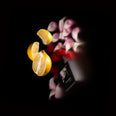What does vetiver smell like? A question that evokes the earth's spirit—rich, deep, and unwavering. Vetiver conveys the essence of wet soil, ancient forests, and nature's untamed roots. Its aroma, a potent blend of woody, smokey, and fresh notes, has long been admired, immersing those who experience it in a timeless, natural harmony. From its Indian origins to its crucial role in fine fragrance, vetiver has shown to be an indestructible force, both intriguing and enduring. Let us explore its intriguing beauty.
What is Vetiver?
Vetiver (Chrysopogon zizanioides) is a tall, fragrant grass originally native to India, but now grown widely across tropical and subtropical regions around the world. Major producers include Haiti, Indonesia, and Réunion Island. While it may look like an ordinary grass on the surface, it’s anything but ordinary.
What makes vetiver special is its deep, strong root system. These roots not only prevent soil erosion but are also the source of vetiver essential oil—a prized ingredient in perfumery and aromatherapy.
Vetiver oil is extracted from these roots and is known for its earthy, smoky, woody scent. It's often used as a base note in perfumes to add depth, warmth, and a sense of grounding.
There are many types of vetiver, mainly due to differences in geography, climate, and cultivation methods. That’s why the scent and quality of vetiver can vary so much.
Beyond fragrance, vetiver is valued for its calming, cooling, and skin-soothing properties, making it popular in skincare and wellness practices around the world.
What Does Vetiver Smell Like?
Vetiver belongs to the woody fragrance family and is traditionally associated with more masculine scents—but its complexity makes it a favorite across all types of perfumery today.
At its core, vetiver smells warm, dry, and deeply earthy, like sunbaked grass with damp soil clinging to its roots. It carries a unique blend of sharpness and softness—sometimes smoky and leathery, other times green, floral, or slightly citrusy, depending on how it’s processed and what it’s blended with.
There’s no single “vetiver smell.” The scent can shift dramatically based on where the vetiver is grown, how it’s distilled, and what other notes surround it. That said, most vetiver varieties share a few familiar characteristics:
- Sharp and dry
- Earthy and rooty
- Woody and slightly resinous
- Occasionally citrusy or soapy (like a deeper, more grounded lemongrass)
- Sometimes floral, smoky, or even medicinal
Some compare vetiver’s earthiness to patchouli, but vetiver tends to be more refined and complex, with a resinous depth that lingers. It also shares a brightness with lemongrass, though it’s far richer and darker in tone.
In perfumery, vetiver is often softened by sweet, spicy, or citrusy notes, transforming its bold natural scent into something elegant and balanced. It adds structure and warmth to colognes and perfumes alike—often evoking the cozy nostalgia of an old-world barbershop, while in modern compositions, it's a grounding, sensual base used in both unisex and women’s fragrances.
Think of vetiver as a scent that whispers stories of the earth: tangled roots, scorched grass, smoky woods, and a touch of green freshness. It’s versatile, timeless, and always a little mysterious.
Where Does the Vetiver Scent Come From?
The rich, earthy scent of vetiver comes not from its leaves or flowers but from its roots. Vetiver’s root system grows deep and vertically into the soil, anchoring the plant while also storing the complex aromatic compounds that make it so distinctive.
These roots are typically harvested when the plant is between 18 to 24 months old, after which they’re washed, sun-dried, chopped, and soaked in water before the essential oil is extracted using steam or hydro-distillation.
What sets vetiver apart in the world of perfumery is its authenticity—there’s no synthetic substitute that can truly mimic its depth. Its aroma is incredibly complex, containing over 100 natural chemical compounds, including:
- Khusimone: the primary molecule behind vetiver’s signature earthy and woody scent
- Vetivone: adds woody and medicinal nuances
- Nootkatone: brings a subtle grapefruit-like freshness, which gives vetiver a bright, citrusy edge
- Patchoulol: shared with patchouli, contributing a sweet, earthy, and slightly camphorous tone
This intricate chemistry gives vetiver its grounded yet dynamic character, making it a prized ingredient in the creations of indie perfume houses.
The Role of Vetiver in Perfumery
Vetiver plays a quiet but powerful role in perfumery. It's often found in the base of a fragrance, where it adds depth, balance, and helps it last.
There are two well-known types:
- Vetiver Haiti: Clean, green, and slightly sweet. Grown in Haiti, it has a smooth, refined scent that adds freshness and polish to a perfume.
- Vetiver Java: Earthy, smoky, and more rugged. From Indonesia, it’s darker and more intense than other types, with a deep, rooty scent.
Used alone or together, these two forms of vetiver give perfumers a way to shape emotion—whether it's something soft and serene or bold and intriguing.
What Scents Pair Well with Vetiver?
Vetiver is a versatile ingredient that blends well with a wide range of notes.
- Woody Notes: Vetiver naturally complements other woody ingredients like sandalwood, cedarwood, patchouli, and oakmoss. Together, they build a strong, grounded base with a smooth, earthy profile.
- Musk: Soft and clean, musk rounds out vetiver’s rawness. The combination feels warm, subtle, and wearable—perfect for everyday depth.
- Cherry: A touch of cherry adds gentle sweetness and softens vetiver’s dryness. It introduces a subtle fruitiness without overpowering the blend.
- Cypress: Cypress brings a fresh, green edge. Its crisp, aromatic profile sharpens the blend and adds clarity to vetiver’s earthiness.
- Bergamot: Bright and citrusy, bergamot lifts the composition. It cuts through heavier notes and adds an airy brightness that keeps the scent feeling fresh.
Understanding Vetiver: Why Its Scent Divides Opinions
Vetiver, intriguingly, isn’t adored by all noses. Its earthy depth, which some people find musty or damp, might overpower those who are sensitive to strong scents.
In actuality, the fragrance of vetiver interacts closely with the chemistry of each person's skin, changing in response to hormones, skin pH, moisture content, and even body temperature. This uniquely personal chemistry may amplify certain nuances. Vetiver isn't unpleasant, simply particular—its poetry interpreted uniquely by each wearer.
Vetiver Fragrances from Buchart Colbert
Buchart Colbert’s fragrance collection is distinguished by elegance, refinement, and meticulous artistry. Among its most intriguing offerings is L'Hantise—a scent gracefully balanced between memory and modernity, a whispered poem translated into fragrance.
L'Hantise – A Symphony of Memories
- Top Notes: Bergamot, Rosewood, Red Currant (Luminous, fresh, subtly sweet)
- Heart Notes: Muguet, Raspberry, Herbal nuances (Delicate florals, nostalgic charm)
- Base Notes: Vetiver, Patchouli, Amber (Deeply smoky, warm, enigmatic)
Inspired by Chopin’s haunting melodies, L'Hantise gently wraps the senses in a delicate blend of florals and bright citrus, grounded by the smoky depth of vetiver. While the scent stirs feelings of longing and memory, its modern composition feels entirely of the present. For those drawn to fragrances that carry both emotion and elegance, L'Hantise is an olfactory journey — mysterious, artful, and beautifully composed.
The Timeless Appeal of Vetiver
What does vetiver truly evoke? A fragrance of timeless allure—earthy yet sophisticated, smoky yet refreshingly nuanced. Vetiver’s distinctive scent profile remains an indispensable element in classic and modern perfumery, effortlessly embodying elegance and complexity. Whether enriching iconic perfumes or inspiring contemporary creations, vetiver fragrances continue captivating the senses, inviting you deeper into their quietly powerful charm. Discover what vetiver smells like for yourself—explore our curated collection and experience scents beyond the ordinary.
FAQs
1. Does Vetiver Smell Like Patchouli?
Similar, but think again. Both are earthy, but vetiver's scent leans drier, greener, and smokier, whereas patchouli stays sweeter and muskier.
2. Does Vetiver Smell Good?
Undeniably elegant. Vetiver perfumes are easily stylish and consistently memorable, evoking a subtle appeal that grounds scents in exquisite fragrance combinations.


